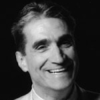Robert Pinsky

Robert Pinsky
Robert Pinskyis an American poet, essayist, literary critic, and translator. From 1997 to 2000, he served as Poet Laureate Consultant in Poetry to the Library of Congress. Pinsky is the author of nineteen books, most of which are collections of his poetry. His published work also includes critically acclaimed translations, including The Inferno of Dante Alighieri and The Separate Notebooks by Czesław Miłosz. He teaches at Boston University...
NationalityAmerican
ProfessionPoet
Date of Birth20 October 1940
CityLong Branch, NJ
CountryUnited States of America
When I was a kid, there was unhappiness in my family - was dealt with partly by escaping to television. And from a very early age, for whatever reason, I became scornful and resistant to and angry about that. And some other time in my life, I realized that there's a lot I loved in television.
I am a frustrated saxophone player. If I could, I would abandon all of my books, and I would trade it all if I could play the way people I admire play.
I think art is not an ornament or refinement at the fringes of human intelligence, I think it's at the center. It's at the core.
I delight sometimes in saying to - as when I'm a teacher, I love saying, 'This is really important, so don't write it down.' To me, what you retain is a very important filter.
It's true that school can poison things - some people hate W.C. Williams' little poem about the wheelbarrow because somebody bullied them with it in school,
Poetry is not easy. Or should I say, real poetry is not easy.
Vivid and reflective, documentary and visionary, re-imagining the city of New York with the same urgency that ponders the opening words of Genesis, this is a passionate, artful and re-readable book.
Poetry's medium is not merely light as air, it is air: vital and deep as ordinary breath.
When I had no roof I made audacity my roof.
A sentence is like a tune. A memorable sentence gives its emotion a melodic shape. You want to hear it again, say it—in a way, to hum it to yourself. You desire, if only in the sound studio of your imagination, to repeat the physical experience of that sentence. That craving, emotional and intellectual but beginning in the body with a certain gesture of sound, is near the heart of poetry.
Whatever makes a child want to glue macaroni on a paper plate and paint the assemblage and see it on the refrigerator - that has always been strong in me.
Deciding to remember, and what to remember, is how we decide who we are.
In the particular presence of memorable language we can find a reminder of our ability to know and retain knowledge itself: the brightness wherein all things come to see.
Poetic language is singularly appropriate for recounting the life of the king who is traditionally accepted as the author of the poetic psalms, some of which are included in the narrative.